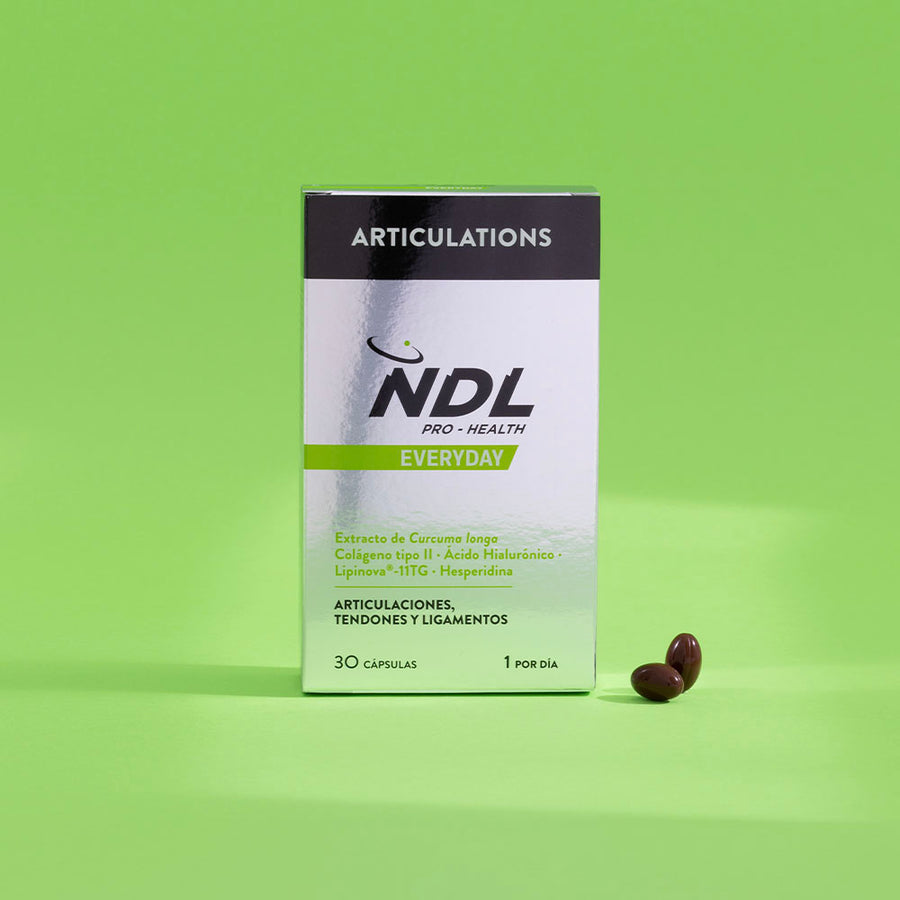Featured Products

Articulations
See productAs the years go by, the natural wear and tear of our bones and joints can start to show: stiffness, discomfort when moving, or loss of agility are common signs that affect both active and sedentary people. In this context, collagen has become one of the most recommended supplements to support joint and bone health.
But are all types of collagen the same? Which one is best for effectively and sustainably taking care of your bones and joints?
In this article, we explain the different types of collagen, which are most suitable for each need, and how to choose the ideal supplement to support your joint health from the inside out.
What is collagen and why is it important for bones and joints?
Collagen is the most abundant protein in the human body and a key component of tissues such as skin, tendons, ligaments, cartilage, and of course, bones. It acts like a kind of “glue” that holds body structures together, providing strength, flexibility, and support.
In joints, collagen is an essential component of cartilage, the tissue responsible for cushioning movement and preventing bones from rubbing against each other. In bones, it contributes to density and strength, helping to prevent fragility.
However, over time (especially after the age of 25–30), the body’s natural collagen production declines, which may lead to a higher risk of joint wear, loss of elasticity, or even bone issues such as osteoporosis.
For this reason, many people turn to collagen supplementation as a way to support musculoskeletal health and prevent age-related deterioration, intense exercise strain, or joint-related conditions.
Types of collagen and their function in the body
There are at least 28 different types of collagen in the human body, but only a few play a key role in bone and joint health. Understanding their differences is crucial when choosing the right supplement:
- Type I collagen: Ideal for bone structure. This is the most abundant type in the body and is found in bones, tendons, ligaments, and skin. Its main function is to provide firmness and structural strength. While it doesn’t directly act on cartilage, it helps strengthen bone tissue.
- Type II collagen: The most effective for joints. This is the main component of articular cartilage, the tissue that covers the ends of bones and prevents them from rubbing. Its role is essential: it provides elasticity, resilience, and cushioning. Supplementation with type II collagen is directly linked to improved mobility, reduced joint discomfort, and better cartilage maintenance—especially in active people, older adults, or those experiencing joint wear.
- Type III collagen: Supportive for connective tissues. It supports the structure of organs, blood vessels, and skin, and is usually found alongside type I. While not the most relevant for joint health, it can complement the effects of structural collagen.

What is the best collagen for bones and joints?
When choosing a collagen supplement, not only the type matters, but also its form, origin, and combination with other ingredients that enhance its effectiveness. When it comes to joints, type II collagen is without a doubt the most specific and effective.
- Undenatured type II collagen: this is the most active form of type II collagen, as it retains its original structure. It works at the immune level to help preserve cartilage and reduce inflammation. Several studies have shown its effectiveness in improving mobility and reducing joint discomfort at very low doses (as little as 40 mg daily).
- Hydrolyzed collagen: this is a pre-digested form of collagen (usually types I and III), which makes it easier to absorb. It is more focused on structural support for bone and connective tissue and is a good option for strengthening bones, skin, or tendons, although its action on joints is less specific than type II.
Ingredients that enhance its effect:
- Vitamin C: essential for natural collagen synthesis.
- Hyaluronic acid: improves joint hydration and elasticity.
- Magnesium, turmeric, or boswellia: support bone and joint health and help reduce inflammation.
In short, if your priority is to care for your joints and prevent cartilage deterioration, undenatured type II collagen is the best choice. If you're also looking to strengthen bones and connective tissues overall, it may be beneficial to combine it with other types or specific ingredients.
Available formats and how to take collagen
Nutritional collagen is available in various formats, each with its own advantages. Choosing the right one depends on your personal preferences and daily routine.
- Powder: one of the most common formats, especially for hydrolyzed collagen. It can be easily mixed into water, coffee, smoothies, or yogurt. Ideal for those who like to take it with breakfast or at a fixed time of day. It typically has a neutral or lightly flavored taste.
- Capsules or tablets: a convenient and practical option, especially for undenatured type II collagen, which is taken in very low doses (usually one capsule per day). Perfect for those seeking simplicity and speed without any preparation.
- Liquid: some supplements combine collagen with other functional ingredients in drinkable form. They are often absorbed quickly, but require refrigeration once opened and may have added flavors.
When to take it? Collagen can be taken at any time of the day, although many people prefer to take it in the morning with breakfast or after exercising.
For how long? To notice real benefits, it's important to take it consistently over time. A minimum of 8 to 12 weeks is recommended, although many people incorporate it continuously as part of their bone and joint care routine.
Who can benefit most from collagen for bones and joints?
While collagen is useful for anyone looking to support their bone and joint health, certain groups can particularly benefit from supplementation:
- Older adults: after the age of 30, the body's natural collagen production gradually declines. In later years, this can lead to decreased bone density, joint stiffness, or discomfort when moving.
- Athletes and active individuals: intense physical activity can cause more joint wear, especially in high-impact sports like running, padel, or CrossFit. Adding collagen to your routine helps protect cartilage and prevent discomfort caused by overuse.
- People with joint conditions or wear: those with osteoarthritis, mild arthritis, or cartilage wear may find type II collagen a helpful ally for reducing discomfort and improving joint function, always as a complement to medical guidelines.
- Women in menopause: during menopause, declining estrogen levels accelerate collagen and bone mass loss. Supplementation can help slow joint deterioration and support bone and connective tissue health.
In conclusion, collagen is a key ally in maintaining healthy bones and joints, especially as we age or expose our bodies to high physical demands. However, not all collagens work the same way: undenatured type II has proven to be the most effective at protecting cartilage, improving mobility, and reducing joint discomfort.
Choosing a high-quality supplement with the right form and composition can make a big difference in your daily well-being. Combined with a balanced diet, proper exercise, and healthy habits, you’ll be reinforcing the foundation for an active and healthy life in the long term.

From the NDL Pro-Health team we will provide you with tips to maintain a healthy lifestyle. Sharing knowledge and product recommendations to offer optimal solutions for your daily routine, for your workouts and subsequent recovery, all with the goal of helping you achieve physical and mental wellness.

















